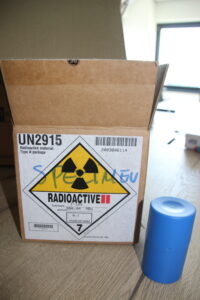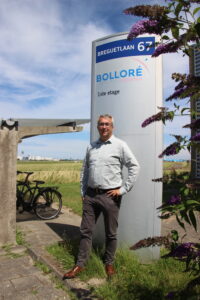Like Special Cargo Services, freight forwarder Bolloré Logistics ‘ branches are located at two logistics hotspots in the Netherlands: at Schiphol Airport and in Rotterdam. That’s also what makes collaboration so easy. Anytime dangerous goods are involved at Bolloré, Special Cargo comes into the picture. Not only in logistics operations, but also in terms of employee training, says Michel Meekel of Bolloré.
Expedition World
“Very convenient that we are so close to each other. We can just drop in on each other to exchange documents or have a quick chat,” says Michel Meekel, quality & compliance manager at Bolloré Logistics. Like Special Cargo Services, Bolloré is located on Breguetlaan in Oude Meer, on the border of the Schiphol grounds. Once started as a French family business for the paper processing industry in Africa, it is now a major international company. Bolloré Logistics is the logistics arm in the freight forwarding world. “That means we act as an agent on behalf of the client – the shipper – to arrange logistics services. For them, we take care of the pre-, main and on-carriage worldwide, including handling customs formalities. We – in turn – look for the most suitable logistics service providers to go with that,” Michel says.
Gatekeeper
If those shipments contain dangerous goods, they must be prepared for (continued) transport in accordance with IATA, ADR or other dangerous goods regulations. Special Cargo Services is always our partner for this purpose. “Forwarders like Bolloré do have the D approval for air transport of dangerous goods, but we cannot physically inspect the cargo ourselves. Special Cargo’s dangerous goods specialists can. For that, as a company, you need government approval. And Special Cargo has that.” This so-called E-recognition indicates that you are a company specialized in the transportation of dangerous goods by air. In doing so, Special Cargo takes over the legal liability of shippers, Michel explains. “In fact, Special Cargo works for Bolloré as a kind of gatekeeper: the employees ensure that the shipment is in compliance with IATA and other regulations and that the air waybill corresponds to the cargo. Fully compliant, in other words. This is important, because otherwise the shipment can be stopped at the airport.”
“Special Cargo is like a gatekeeper: the shipment arrives at the airport fully compliant”
Radioactive sources
One of the hazard classes that Special Cargo controls for Bolloré is Class 7: radioactive materials. These are mostly isotopes and contrast agents, intended for medical applications. “That is socially sensitive and sometimes requires some explanation. Especially since radioactive substances are also used for measurements in the oil and gas industry.” Such a radioactive source is wrapped in lead or some other protective device before transportation, to minimize radiation escape. The whole package then weighs 25 kg, for example, while the source itself weighs only 2 grams.
Dosimeter
How does this logistics process work? The radioactive sources are made, among other things, at the nuclear reactor in Petten and are transported by a regular transporter from the customer to Special Cargo. Once there, the cargo is unloaded and placed in the warehouse. A dangerous goods expert from Special Cargo performs the necessary checks: is the packaging correct and undamaged, is the labeling correct, are the transport documents correct? He corrects any issues that are not compliant. Of course, safety comes first: the employee wears a dosimeter, a device that indicates how much radiation he is exposed to and whether it is within the official values. If not, a colleague takes over the work from him.
Waiting time
Meanwhile, the driver waits for Special Cargo to complete all work. Then it reloads the shipment and immediately drives on. Michel: “This way, the waiting time for the driver is as short as possible. This is important, because the radioactivity of the source is decreasing, and that loss must be minimized as much as possible. After all, there is a patient at the end of the supply-chain waiting for these goods. This is why we always maintain a very tight schedule for transporting radioactive materials. Special Cargo’s role is woven into this logistical process. It actually always goes well. And should anything ever threaten to go wrong, they quickly adapt a sleeve!”
“We keep the waiting time for the driver as short as possible as the radioactivity of the source decreases”
Checking containers
Special Cargo also operates in the Europoort for Bolloré Logistics, Michel continues. “Then it involves checking ocean freight. Sometimes the Special Cargo people also go and check containers on site, to make sure they are properly labeled.” Thus, Bolloré arranges transportation from factory to customer, whether by sea, air, road, or inland waterway. “Through Europe we transport as much as possible by ship. There’s still plenty of room on the inland waterways and it’s better for the environment. For example, hops and malt for a well-known beer manufacturer. That comes from everywhere and nowhere, and is also widely distributed within Europe. Of course, we cannot reach all places by ship. Then the last piece – the so-called last mile – goes by road.”
The permanent training institute
Bolloré employees must, of course, be adequately trained for the work they do. With dangerous goods in particular, there are a variety of mandatory certificates that must be repeated with some frequency. “For that, it’s really the same as the logistics operation: when it comes to dangerous goods, Special Cargo is our regular training institute. These include IATA courses, for example, as well as training in handling radioactive materials. The training location on Koolhoven Avenue is close by, and sometimes we request in-company training here at the office. Our HR department takes care of all that. With help from Special Cargo’s online training portal, which signals when someone’s certificate is about to expire. Very convenient.”

IATA CBTA
Since July 1, a new mandatory training methodology has been introduced from IATA: “Competentiegericht trainen” In English: Competency Based Training and Assessment (CBTA). Michel explains that Bolloré is very happy about this: “We had wanted this for years. Previously, employees were also trained for work they would never do, and that was of no use to them. Moreover, it costs them an unnecessary amount of time. Now they receive training that is more focused on the job they are doing. For example, an employee who prepares air cargo but does not have to classify it, now takes the IATA 7.1B course. WITHOUT classifying.”
The bar is high
“I would venture to say that in our training plan we set the bar higher than what is required by law,” Michel continued. “Take, for example, the training in Competence in Handling dangerous goods. Officially, at least three people within our company must have taken this training, but we now have eight ‘competent’ employees here in the office. Everyone who has anything to do with dangerous goods takes this awareness training.”
Changed labeling
In addition to distributing radioactive materials, Bolloré Logistics is also a freight forwarder of a variety of other products, such as fragrances and flavors, medical products, medicines, and industrial equipment. All these shipments Special Cargo makes completely ready for (air) transport. And that goes beyond the control work at the radioactive substances: preparing and printing transport documents, packaging, and applying labels. Not an easy job, says Michel: “What you always have to take into account is that the classification and labeling may be different at the beginning of the transport than at the end. For example, a shipment arrives by road, which must then be prepared for air transport. Then, among other things, an air waybill must be affixed to the package. But then sometimes there are already so many labels on them that there is almost no room left. And no labels should be overlaid. How do you solve that? Then it’s a good thing the specialists at Special Cargo Services are here!








